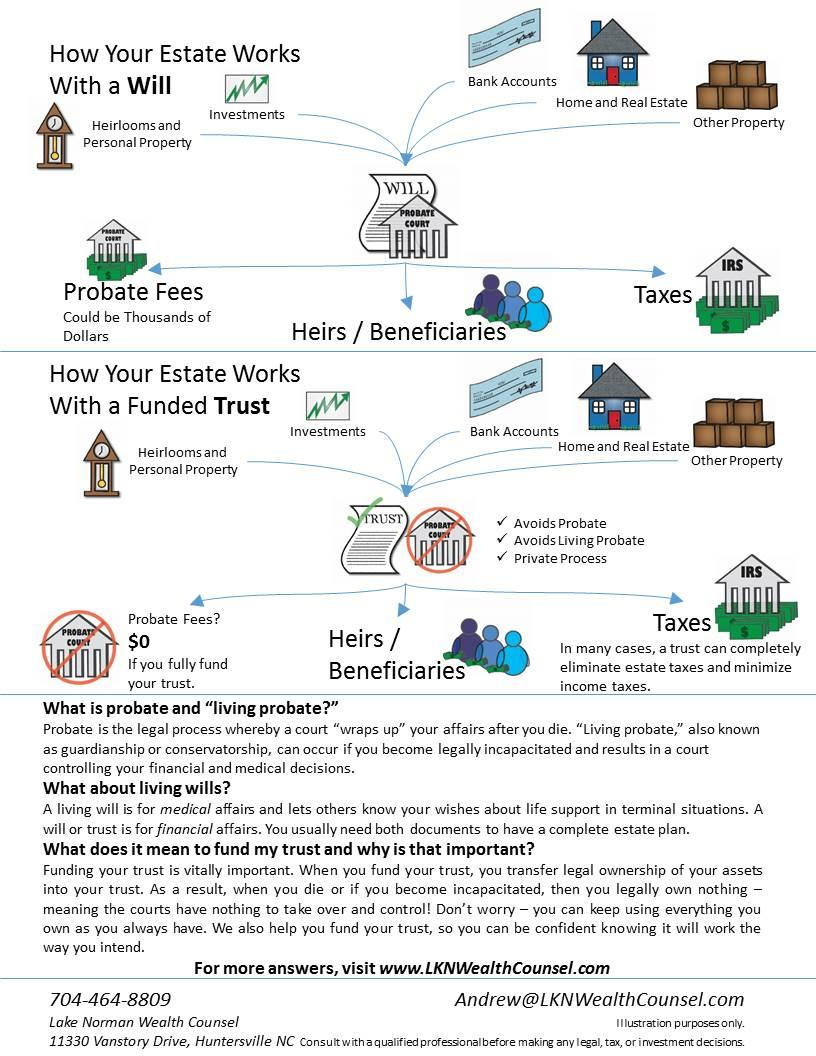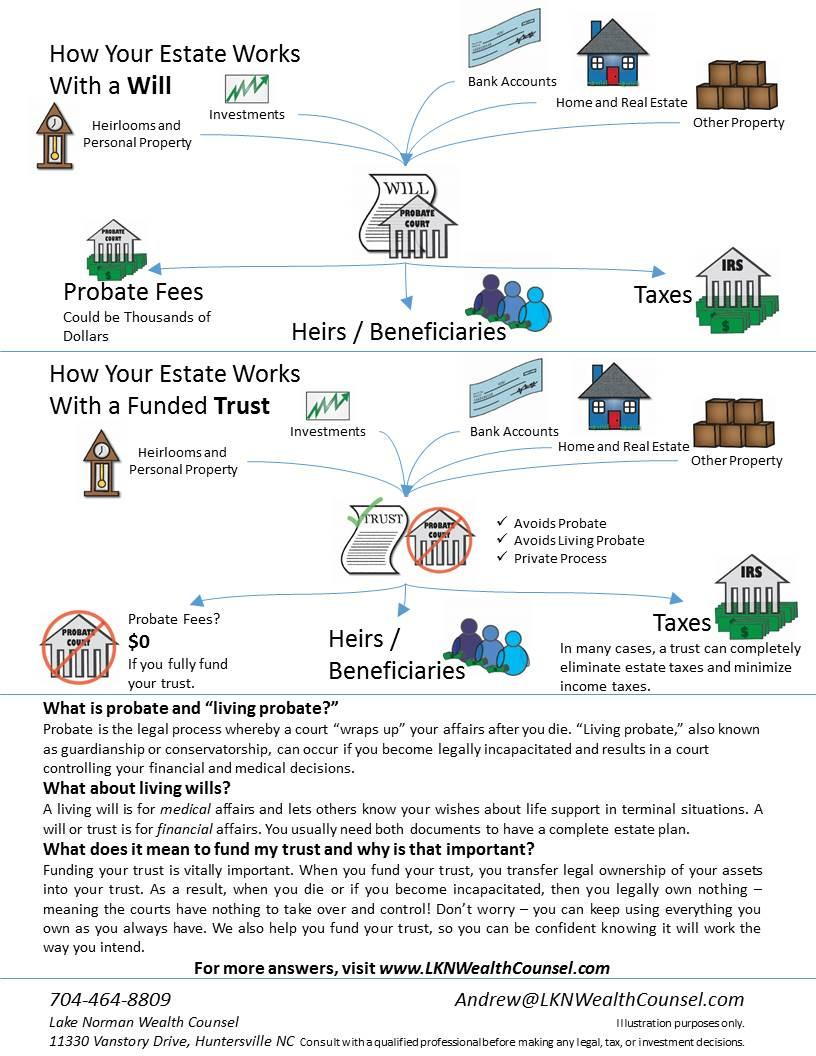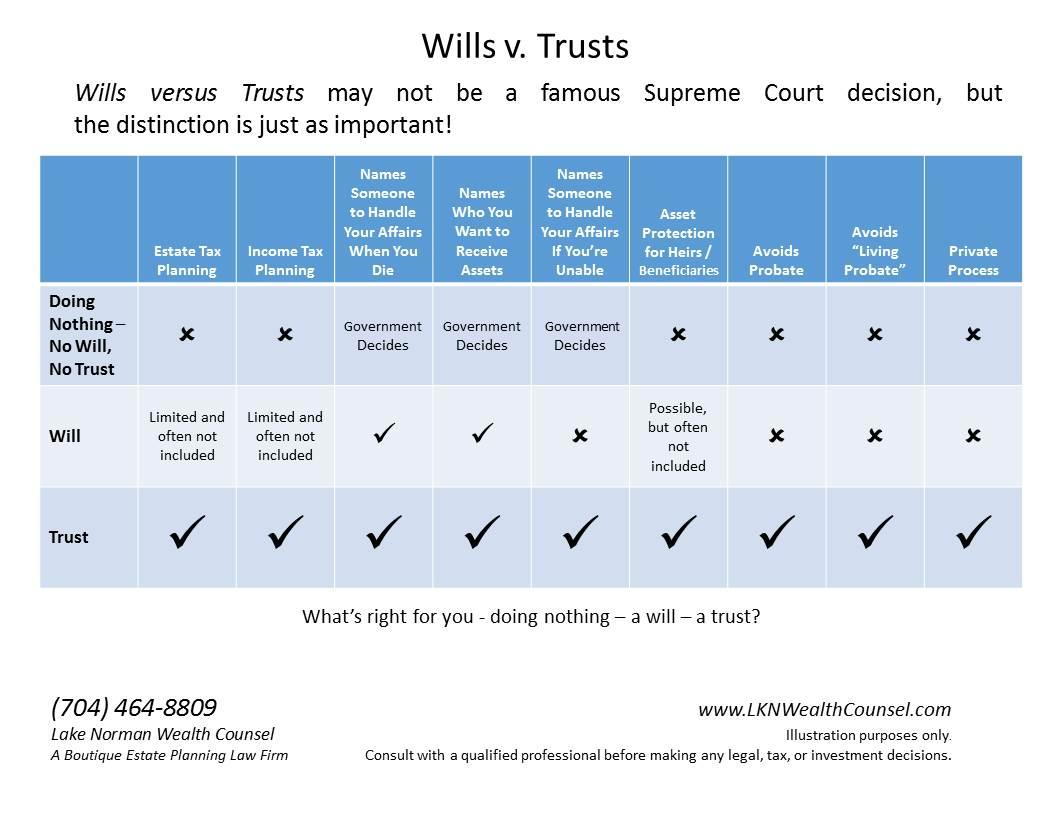Contact Us
Our Office
Reviews and Testimonials

- posted: Aug. 16, 2019
Wills, Trusts and Dying Intestate: How They Differ
Most people understand that having some sort of an estate plan is, as Martha Stewart would say, a “good thing.” However, many of us don’t take the steps to get that estate plan in place because we don’t understand the nuances between wills and trusts – and dying without either.
Here’s what will generally happen if you die, intestate (without a will or trust), with a will, and with a trust. For this example, we’re assuming you have children, but no spouse:
Intestate. If you should die intestate, your estate will go through probate and all the world will know what you owned, what you owed, and who got what. Your mortgage company, car loan company, and credit card companies will all seek payment on balances you owed at the time of your death.
After that, state law will decide who gets what and when. Read my blog here: What Happens If You Die without a Will
- For example, if your only heirs are your children and you have not provided any instructions, state law will mandate divvying up proceeds equally.
- Your older children will get their shares immediately if they’ve attained adulthood.
- But, the court will appoint a guardian to manage the money for your minor children until they become adults.
- Shockingly, that guardian can charge a lot of money and be a total stranger - as can the guardian who raises your child.
- Yes, if you die without a valid will, the court, not you, will decide who raises your minor children.
Keep in mind that since your death has been published to alert valid creditors, it’s not uncommon for predators (fake creditors) to come forth and make demands for payment – even if they’re not owed anything.
The bottom line? Dying intestate allows state law and the court to make all the decisions on your behalf – regardless of what your intent might have been. Publicity is guaranteed.
Will. If you should die with a valid will, your assets will still go through the probate process. However, after creditors have been satisfied, the remaining assets go to whom you’ve identified in your will.
- So, if you want to leave money to your children and name a guardian for the minor ones, the court will usually abide by your wishes.
- The same holds true if you specified that you wanted to give assets to a charity, your Aunt Betty, or your neighbor.
- Keep in mind that predatory creditors are still an issue as your death has been publicized. Even with a will, probate is a public process.
The bottom line? While a court oversees the process, having a will allows you to tell the court exactly how you want your estate to be handled. But, a public probate is still guaranteed.
Trust. If you’ve created a trust, you’ve taken control of your estate plan and your assets. Trust assets are not subject to the probate process and one of the most important benefits of trusts is that they are private. Notices are not published, so you avoid predators coming after your estate. You also avoid the high cost and delays of probate Court.
You’ll have named a trustee to manage your estate with specific instructions on how your assets should be dispersed and when.
- One word of caution – trusts must be funded in order to bypass probate.
- Funding means that your assets have been retitled in the name of your trust.
- Think of your trust as a bushel basket. You must put the apples into the basket as you must put your assets into the trust for either to have value.
You do still need a will to pour any assets inadvertently or intentionally left out of your trust and to name guardians for minor children.
Another important difference is a will only becomes relevant/takes effect when you have passed away whereas a fully funded trust based plan allows you to manage your affairs while you are alive and well, appoints successor trustees to take care of you while you are incapacitated and unable to manage your affairs, and lastly when you’ve passed away.
The bottom line? Trusts allow you to maintain control of your assets through your chosen trustee, avoid probate, manage your affairs while you are incapacitated and leave specific instructions so that your children are taken care of – without receiving a lump sum of money at an age where they are more likely to squander it or have it seized from them from a divorcing spouse, creditor, or predator.
Don’t let the will versus trust controversy slow you down. Call the office today; we’ll put together an estate plan that works for you and your family whether it be a will, trust, or both.



